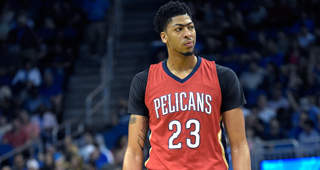Of all the improbable things about Anthony Davis, playing professional basketball for three years with a torn labrum is high on the list, considering the labrum is an integral part of the shoulder that holds the whole mechanism together. In a game that, broadly speaking, requires two sturdy arms, it’s less than optimal to be out on the court with one of those arms not quite as tightly fastened to the torso as it could be. We can be thankful, as people invested in the structural integrity of Anthony Davis’s limbs, that he has finally decided to fix that problem. He’s set to undergo surgery on both his not-totally-intact shoulder and a knee he banged against C.J. McCollum in a loss to the Blazers last Friday. This means The Brow’s season is over. It also means the Pelicans are officially packing it in.
Every year, there’s an NBA team that appears primed to build on the modest success of their previous season and then spends six months stepping on rakes. This is explicable in specific ways, but in a cosmic sense, can only be chalked up to crummy luck. In the Pelicans’ case, they started the season a month later than the rest of the league, losing 11 of their first 12 games while struggling to adapt to Alvin Gentry’s pacey offense, burdened with an incomplete roster that kept bleeding players as the schedule ticked along.
Tyreke Evans made his debut in December and was done for the year by February. Jrue Holiday was eased into the season on a minutes restriction. Davis, Omer Asik, Norris Cole, and Kendrick Perkins all picked up ailments that shelved them for a bit. On many nights, New Orleans have run out lineups that mix bonafide NBA players with D-League flotsam. Even if the preseason prognostications about Gentry invigorating a stale offense and Davis finding a near-MVP level had turned out to be correct, the Pels were never going to compete for a playoff spot this year, wounded as they have been.
There is all that—misfortune for which no one can be credibly blamed—and then there is the fact that, injuries and new coach growing pains aside, general manager Dell Demps should be fired this offseason. It’s safe to assume that in a small, not particularly basketball-crazy market like New Orleans, with an ownership situation that’s hazy and fraught, Demps hasn’t been empowered to enact a slow rebuild, but the job he has done putting talent around Anthony Davis has demonstrated a fundamental misunderstanding of how championship teams are constructed.
Looking at recent NBA history, what Demps has done in New Orleans is reminiscent of the harried, failed project that was LeBron James’s first seven years with the Cavaliers. After Anthony Davis’ rookie season, in the 2013 draft, Demps essentially downshifted the Pels into win-now mode by trading Nerlens Noel and a future first-round pick that turned out to be Elfrid Payton for Jrue Holiday, a player who, even before his career got derailed by lower body injuries, wasn’t a star so much as a solid starting point guard. A couple weeks after the Holiday trade, Demps overpaid Tyreke Evans with a four-year, $44 million contract and then stuck him in a third-guard role behind Holiday and Eric Gordon. This past summer, Demps inked Omer Asik to a five-year, $60 million extension that became the worst contract in the league the moment Asik signed it.
These three moves—combined with a lethal Eric Gordon max deal that was defensible at the time but hasn’t worked out—are the reason the Pels ceiling heading into the season was something like a six-seed and a first-round playoff exit. It just so happens that with so many players sitting on the sidelines in suits, the team has been much worse than ordinary.
Fortunately, all of New Orleans’ problems are fixable if they realize that their season from hell has been a function of their general manager’s woeful team-building instincts in addition to various strains and sprains. By shutting Davis down, the Pels have almost definitely landed themselves a top-seven draft pick. Gordon is on an expiring contract, and both Evans and Holiday come off the books in 2017. Ryan Anderson is a fine player, but he’s on the verge of getting just-shy-of-Kevin-Love money that the team would be wise not to pay him. Asik is likely unmoveable, but his deal will seem a little less painful when the cap shoots up this summer.
Most importantly, Davis will enter the first year what’s going to be a bargain of a max contract next season. Should the Pelicans rid themselves of Demps, whoever comes in as his replacement will have room to maneuver and, ownership willing, plenty of time to implement a vision that will be realized just as The Brow is entering his prime.
Of course, that’s much easier said than done. If rounding a team into title-contending shape were so simple, anyone with half a basketball brain would have a whole hand’s worth of rings. But one thing every franchise can do that’s not difficult is maintain an organizational humility and an honesty with themselves about past mistakes. The Pelicans need to acknowledge that, since drafting Davis, Demps has rushed the team along in a way that’s been counterproductive. That’s step one in salvaging the Anthony Davis Era. What follows after that is complicated, but with someone new and capable in charge, the ultimate goal becomes achievable.



